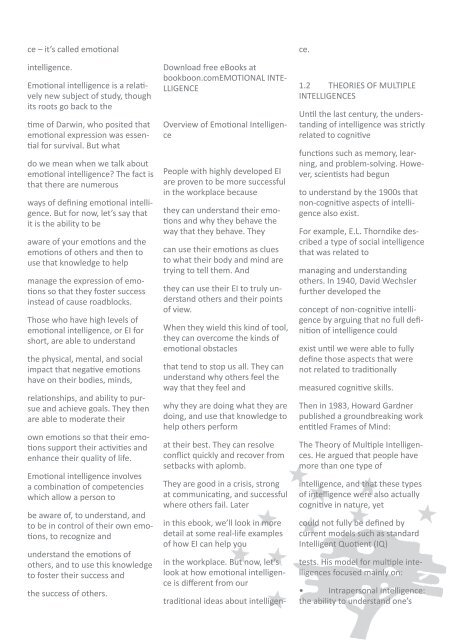Projeto Manual do Colaborador Rede dos Sonhos2
Create successful ePaper yourself
Turn your PDF publications into a flip-book with our unique Google optimized e-Paper software.
ce – it’s called emotional<br />
intelligence.<br />
Emotional intelligence is a relatively<br />
new subject of study, though<br />
its roots go back to the<br />
time of Darwin, who posited that<br />
emotional expression was essential<br />
for survival. But what<br />
<strong>do</strong> we mean when we talk about<br />
emotional intelligence? The fact is<br />
that there are numerous<br />
ways of defining emotional intelligence.<br />
But for now, let’s say that<br />
it is the ability to be<br />
aware of your emotions and the<br />
emotions of others and then to<br />
use that knowledge to help<br />
manage the expression of emotions<br />
so that they foster success<br />
instead of cause roadblocks.<br />
Those who have high levels of<br />
emotional intelligence, or EI for<br />
short, are able to understand<br />
the physical, mental, and social<br />
impact that negative emotions<br />
have on their bodies, minds,<br />
relationships, and ability to pursue<br />
and achieve goals. They then<br />
are able to moderate their<br />
own emotions so that their emotions<br />
support their activities and<br />
enhance their quality of life.<br />
Emotional intelligence involves<br />
a combination of competencies<br />
which allow a person to<br />
be aware of, to understand, and<br />
to be in control of their own emotions,<br />
to recognize and<br />
understand the emotions of<br />
others, and to use this knowledge<br />
to foster their success and<br />
the success of others.<br />
Download free eBooks at<br />
bookboon.comEMOTIONAL INTE-<br />
LLIGENCE<br />
Overview of Emotional Intelligence<br />
People with highly developed EI<br />
are proven to be more successful<br />
in the workplace because<br />
they can understand their emotions<br />
and why they behave the<br />
way that they behave. They<br />
can use their emotions as clues<br />
to what their body and mind are<br />
trying to tell them. And<br />
they can use their EI to truly understand<br />
others and their points<br />
of view.<br />
When they wield this kind of tool,<br />
they can overcome the kinds of<br />
emotional obstacles<br />
that tend to stop us all. They can<br />
understand why others feel the<br />
way that they feel and<br />
why they are <strong>do</strong>ing what they are<br />
<strong>do</strong>ing, and use that knowledge to<br />
help others perform<br />
at their best. They can resolve<br />
conflict quickly and recover from<br />
setbacks with aplomb.<br />
They are good in a crisis, strong<br />
at communicating, and successful<br />
where others fail. Later<br />
in this ebook, we’ll look in more<br />
detail at some real-life examples<br />
of how EI can help you<br />
in the workplace. But now, let’s<br />
look at how emotional intelligence<br />
is different from our<br />
traditional ideas about intelligence.<br />
1.2 THEORIES OF MULTIPLE<br />
INTELLIGENCES<br />
Until the last century, the understanding<br />
of intelligence was strictly<br />
related to cognitive<br />
functions such as memory, learning,<br />
and problem-solving. However,<br />
scientists had begun<br />
to understand by the 1900s that<br />
non-cognitive aspects of intelligence<br />
also exist.<br />
For example, E.L. Thorndike described<br />
a type of social intelligence<br />
that was related to<br />
managing and understanding<br />
others. In 1940, David Wechsler<br />
further developed the<br />
concept of non-cognitive intelligence<br />
by arguing that no full definition<br />
of intelligence could<br />
exist until we were able to fully<br />
define those aspects that were<br />
not related to traditionally<br />
measured cognitive skills.<br />
Then in 1983, Howard Gardner<br />
published a groundbreaking work<br />
entitled Frames of Mind:<br />
The Theory of Multiple Intelligences.<br />
He argued that people have<br />
more than one type of<br />
intelligence, and that these types<br />
of intelligence were also actually<br />
cognitive in nature, yet<br />
could not fully be defined by<br />
current models such as standard<br />
Intelligent Quotient (IQ)<br />
tests. His model for multiple intelligences<br />
focused mainly on:<br />
• Intrapersonal Intelligence:<br />
the ability to understand one’s


